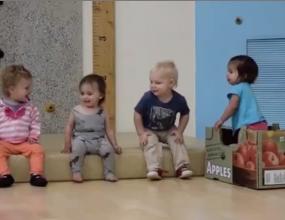Young Toddlers Imitate Each Other

Stella sits in a special spot, a box just big enough for one. Her friend Wyatt (navy blue shirt) grasps the lip of the box with both hands while Maya (gray jumpsuit) grips the side with one hand, and they both pull (00:02). The box does not budge.
Maya walks to the back of the box (00:05) perhaps thinking that pushing rather than pulling would be a more effective strategy. Her heel is against the gym mat preventing her from stepping back, and she loses her balance momentarily (00:06). Wyatt reaches inside the box and tugs on Stella’s blue shirt (00:07 - 00:09). He may be thinking about ways to reduce the weight of the box. Wyatt likely assumes that if the box were empty they could move it more easily.
Stella does not want to give up her special seat. Instead, she works to maintain her social connection with Wyatt by rotating her body to follow him with her gaze as he walks around the box and climbs on the gym mat (00:12). Maya sees Wyatt on the other side of the box (00:14) and thinks that he is going to push from the back, so she pulls the lip of the box from the front. Again, the box does not budge.
Wyatt and Maya notice Anna (far left) bouncing while seated on the edge of the thick gym mat and decide to sit beside her (00:23). Stella stands up as if she is thinking about leaving the box. She watches as her friends enjoy popping up and returning to a seated position on the mat (00:23 – 00:26).Together, Anna, Maya, and Wyatt create a new game. Anna bounces energetically while Maya and Wyatt turn their heads and watch (00:23). The pauses to watch let us know that they are playing a social game of imitation rather than just having fun bouncing on the mat individually. Wyatt bounces a bit and Maya bounces quite high while Anna turns her head to watch (00:24). Anna then begins another turn at bouncing (00:28). Wyatt decides to extend the game by adding a new action. He bounces, then stands and taps his feet (00:27). Two-year-old children know that adding new movements elevates one to the leader, the one to be imitated. The heels of his feet are close to the gym mat, and he loses his balance and topples over.
Maya twists her torso and observes Wyatt lying on the mat (00:32). She thinks that looks like fun and gives it a try by falling back and lifting her legs up high. Children often add an exaggerated or unnecessary movement to let other children know they are playing a game. Anna looks over at Maya and Wyatt lying on their backs and decides to imitate her friends (00:34 – 00:38). Wyatt’s accidental fall becomes a new theme in their social game, and he shifts to the role of leader with Maya and Anna as followers.
Wyatt swings his legs downward like a counter-balance in an effort to sit up, but he does not yet have enough core strength (00:39). Cleverly, he rolls to the side and pushes himself up with his arm. Wyatt looks over at the girls before again falling back on the mat (00:45). Does he want the girls to watch what he is about to do? Could Wyatt intend to convey that this time around he is falling back on purpose; that he has transformed an accidental effect (toppling over) into the goal of his play?
Maya sits up and immediately looks over at Wyatt who is lying on his back holding his legs in the air (00:48). The children are reading each other for information about what to do next. Stella pats Wyatt’s leg, perhaps to say, “I’m still here,” or as a way to participate in his physical play without leaving the box. Anna resumes bouncing (00:52), and Maya follows (00:55). While the actions that the children engage in are intrinsically enjoyable they work continually to maintain their social bond.
Wyatt swings his legs downward and bumps Maya (00:58). Maya does not complain. Toddlers, unlike older children and adults, tend to have a more forgiving sense of physical boundaries and personal space. It could be that young children are not yet thinking about the actions of others as deliberate or intentional.
Stella is inspired by the infectious actions of her friends. She makes a noise of excitement and moves up and down as if bouncing on the sidewall of the box (01:05 – 01:11).
The children continue attending to each other although as individuals they begin to favor one action over another. Wyatt throws himself back on the mat with greater zeal. The cushioned mat affords him freedom of movement without harm. Maya resumes enthusiastically bouncing on the edge of the mat (01:12). Unlike a rigid stair or bench the mat gives beneath her bodyweight and enhances the springiness of bouncing up and down. Anna lies back and turns her head to watch Wyatt as if taking a brief rest before resuming bouncing vigorously (01:24). Stella invents a bounce-like action by rocking inside the box (01:21 – 01:24). The springy mat affords these joyful kinesthetic experiences that serve as the basis of early communication and positive social engagement with peers.
